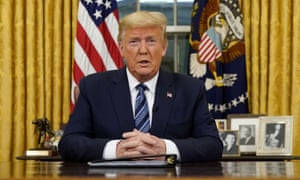Trump’s coronavirus ban on travel from the EU is backfiring already
A live televised address from the Oval Office should have reassured the US. Instead it sowed chaos

Such is the reverse Midas touch of Donald Trump, that his attempt last night to face facts, steady nerves and reassure the public succeeded in spreading panic, sowing confusion and ratcheting up the anxiety.
The fact that Trump delivered a rare, live televised address to the nation should, by itself, have induced calm. It suggested that the president was moving out of fantasyland, abandoning the denial that had led him to promise a miracle was on the way and that the threat of coronavirus was likely to recede as soon as next month, when the weather got warmer. (As recently as Tuesday, he was saying, “It will go away, just stay calm.”) That he was ready to deploy one of the US presidency’s most powerful tools, usually reserved for moments of war or disaster – a TV address from the Oval Office – seemed to signal that he was, at last, facing reality.
Sure enough, when he referred to the virus as a “horrible infection”, after weeks spent dismissing it as a glorified cold or flu, it fed the hope that Trump might finally be ready to acknowledge that his approach up until this moment had not worked – that this was not a problem that could be dealt with in the usual away, swatted aside with a tweet or by hanging a comic nickname around the neck of one of his enemies.
But no sooner had that hope appeared than it faded away. For in the course of nine minutes, Trump swiftly reverted to type. He described Covid-19 as a “foreign virus”, and took pains to point out that “a large number of new clusters in the United States were seeded by travellers from Europe”. His doctrine of “America first” – a phrase he used once again – forever pits the US against the world, with its implication that America’s purity is permanently under threat of contamination by alien hordes. Trump has used that imagery in the context of immigration for more than four years; it should hardly be a surprise that he uses it now in the context of disease.
Equally in character was his preference for the vast, sweeping edict over the detailed, calibrated policy response. What the US needs most is a serious, extensive programme of testing. Currently, the US is bottom of the global league table for coronavirus testing, at a rate of just five people in every million. (South Korea is testing 3,692 people per million.) But that kind of announcement would require too much work, not least because Trump shut down the dedicated Obama-era, White House unit that had focused on preparedness against a global pandemic. It would be too dull and plodding for the man who made his name issuing orders on The Apprentice. Trump prefers the kingly diktat that makes instant headlines and good TV. In the 2016 campaign it was his call for a “total and complete shutdown” on Muslims entering the US. This time it was a ban on travellers from 26 European countries in the Schengen area, starting on Friday. Once again, the would-be medieval monarch was ordering the drawbridge pulled up against the foreign menace.
He surely hoped his subjects would be soothed by such a decisive show of leadership. But because this is Trump, his short speech was riddled with errors that had to be rapidly corrected – thereby spreading confusion rather than clarity. One example: he announced that his Europe ban would “apply to the tremendous amount of trade and cargo” across the Atlantic, prompting the White House to rush out a statement explaining that the president had got it wrong, and that the new policy would, in fact, only apply to people, not goods. If the plan was to project a White House coolly capable in the face of a crisis, that mix-up and Trump’s halting discomfort in front of the teleprompter conveyed the precise opposite.
Above all, the new policy lacked rhyme or reason. Why keep out almost all Europeans, as if this problem is exclusive to Europe (and China), rather than global, and when the US has a rising infection problem all its own? And why exempt the UK, which is hardly coronavirus-free? There was no explanation, so speculation filled the vacuum. Could it be a politically motivated swipe at the EU, which Trump once said he regarded as the US’s greatest “foe”, pointedly giving preferential treatment to Brexit Britain? Was it driven by a motive as base as the fact that Trump has golf courses in the UK (and Ireland), and he didn’t want to harm his own businesses? Or did it spring from a crudely racist worldview that divides the globe into a clean, acceptable Anglosphere set against a tainted, diseased “abroad”?
Whatever the explanation, the address did not work. The clearest proof came in the metric Trump understands best and that terrifies him most, because he believes it holds the key to his prospects of re-election. The headline this morning: “Stock markets tumble as Trump’s Europe travel ban shocks investors”. Truly, he is Midas in reverse.
• Jonathan Freedland is a Guardian columnist
When disinformation is rampant...
... it can swing an election and undermine democracy. In 2020 that threat is real. Academics and experts warn that this year’s election will see a wave of disinformation from domestic actors who have learned from foreign interference in 2016. This year’s tsunami of fake news may well be homegrown as agents seek to sow lies and stir division.
Hyper-partisan news sources, factories of disinformation and a deluge of fake news on social media are no basis on which to inform the American public in 2020. There has never been a greater need for a robust, independent press guided first and foremost by the truth. With your support we can continue to provide fact-based reporting that provides clarity in the face of confusion.
Our journalism is free and open for all, but it's made possible thanks to the support we receive from readers like you across America in all 50 states. None of this would have been attainable without our readers’ generosity – your financial support has meant we can keep investigating, disentangling and interrogating. It has protected our independence, which has never been so critical. We are so grateful.
We hope you will consider supporting us today. We need your support to keep delivering quality journalism that’s open and independent. Every reader contribution, however big or small, is so valuable. Support the Guardian from as little as $1 – and it only takes a minute. Thank you.


No comments:
Post a Comment